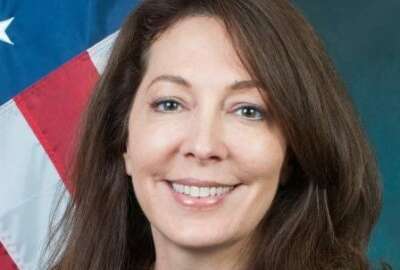

Air traffic controllers support the entire aviation system of the US. There's another group, perhaps less well-known, that keeps the air traffic controllers goi...
Best listening experience is on Chrome, Firefox or Safari. Subscribe to Federal Drive’s daily audio interviews on Apple Podcasts or PodcastOne.
Last week we aired an interview with the executive vice president of the union representing air traffic controllers. Controllers support the entire aviation system of the United States. There’s another group, perhaps less well-known, that keeps the air traffic controllers going. They’re the technical operations people who maintain the immensely complex electronic infrastructure. They’re also members of the Professional Aviation Safety Specialists union, whose president Mike Perrone joined the Federal Drive with Tom Temin.
Interview transcript:
Tom Temin: Mr. Perrone, good to have you on.
Mike Perrone: Good morning. Thanks for having me on.
Tom Temin: So how has the FAA and the PASS gotten along during this whole COVID-19 issue? And what are some of the problems that your members are facing as they do their daily work that can’t be done telephonically?
Mike Perrone: We’ve been working real well with the agency collaborating with them. We started out when this first really came about having daily meetings, sometimes multiple meetings, providing information both from the field level my folks reporting upwards and with the FAA. Just identify issues and concerns. And one of the advantages that we were able to work with he does a lot of our folks, technical folks have to be near the facilities working on the equipment. And obviously the decrease in flights. They’ve been able to do a lot more teleworking. So they’ve been social distancing, working away from the big facilities only going in when they need to maintain equipment or fix outages. So that’s been really helping to social distancing the folks both the traffic controllers and the technicians
Tom Temin: Got it. I didn’t realize they could. Is it possible for them to monitor the state of the equipment from a distance, you know, remotely?
Mike Perrone: They can and then a lot of them also are going into other facilities. Our equipments not you know, think of the FAA. You see the air traffic control tower when you drive up to the airport. Our folks work in towers and comms centers, but a lot of the equipment is all over the airport field out in across the country, from mountain tops in Alaska to high desert out in the ocean, and so they’re spread out working at some of this equipment remotely as well. And then it can monitor the equipment remotely, but the actual fixing, if they have to change a computer board out or fix a power supply, they have to go in and they take care of how they do that and make sure that they protect everybody clean the equipment, clean themselves, disinfect and do their job.
Tom Temin: So in other words, something they might have to fix could be in one of those little boxes that have a red and white checkerboard out on the edge of a runway, or it could be right under the feet of an air traffic controller,
Mike Perrone: Correct. Equipment, for example, the navigational equipment, the red and white boxes that help the pilots land. They go out there and work on that. And unfortunately being so small, if they need more than one person, then they got to take extreme caution, mask and rubber gloves and everything to make sure that they protect each other. When they go into the facility with the air traffic controllers, they have to and they’ve done this a few times where they’ve removed the controllers from one position to work on the equipment. Then brought them back. There’s been some extremes like in Florida, where they actually shut down the air traffic control facility, our technicians moved the equipment over to another location outside the building, set them up. And then they had the cleaning crew come in, clean it to a high level then brought all the equipment back and set them back up.
Tom Temin: Now these different procedures for the different situations, were you able to work these out in advance or perhaps maybe had to do some improvisation to arrive at what to do if X Y or Z happens?
Mike Perrone: A little bit of both. You know, we’ve been again, working a lot of disasters, unfortunately, you know, hurricanes and so forth. So there’s been procedures in place for some of that, this is nationwide worldwide, so they’ve had to improvise some of the ways that they’ve adapted, cleaning is probably the biggest thing to make sure that they clean the equipment prior to any spare parts going into the facility and cleaning afterwards making sure that their traffic is removed from the facility or the area. So there’s been a little bit of both improvising, making sure everybody’s safe and then putting everything back to normal.
Tom Temin: And in working with some of this equipment is there, I guess, ongoing danger of say, electricity or static or high voltage that they have to deal with, in addition to the difficulty of being close to other people or having stuff that has to be sanitized coming in or out?
Mike Perrone: Yeah, I mean, the normal equipment has anywhere from a small amount of voltage, five volt voltage to 10s of thousands of volts. And our folks are trained in that to make sure they properly disconnect or remove any hazards to do through the work through the job and they’ve been trained and highly skilled. People think it’s just a computer or a monitor. It’s a lot more than that. And it varies from light lanes outside with it pilots fly in iOS systems, navigational systems, power supplies, you know. One of the biggest issues is the power that has to run everything in our folks and environmental have that mostly the danger of the high voltage, which batteries or electricity but again, they’re trained in how to minimize that and to work on the system safely.
Tom Temin: Now, there have been a few dozen cases of coronavirus among air traffic controllers. What is the experience so far among PASS members?
Mike Perrone: There’s been some cases of our folks that we represent that have the virus, whether they got it through air traffic controllers that were diagnosed or whether they got it in the public. And every day, we have telecomms with FAA and with medical folks that go through the process of with those people in areas of our folks where they work where they diagnose positive, and then take precautions that isolate them quarantine them, but we’ve been fortunate to have not as many as the air traffic controllers have.
Tom Temin: Got it and sounds like though maybe from the procedures you’ve set up and from working with the FAA, the safest place they can be is on the job?
Mike Perrone: Yeah, they work again, the minimum shifts minimum amount of people going into the facilities there in the back rooms there in other locations other than than where the air traffic folks are. So they’ve spread out as much as they can into larger facilities, the smaller facilities, they do a lot more teleworking a lot more social distancing. So that’s really helped in that regard. And the he has been really working well with us to make sure as occurrences happen that they mitigate any more people getting affected if they’re found positive.
Tom Temin: And just for the record, are most of the members former controllers, or did they come up through electronics ranks? What does it take to become a tech ops person for FAA?
Mike Perrone: So a lot of folks are technicians, a lot of them military, we have a high membership of military folks that come in from different branches that have the electronic background. There are some that have other diverse backgrounds, but mostly the technical in nature, learning from the military or from industry. They maintain the equipment, certify the equipment and monitor. So it’s mostly the technical background that our folks have. We also have folks that we represent, other than technical folks or aviation safety inspectors, they oversee the entire aviation industry, the pilots, the engineers, the technicians that maintain the equipment for the airlines. And those folks come from industry, same thing they’re back on their pilots have flown airplanes, the mechanics and so forth. And then we’ve had engineering services folks, those are folks that they build and help renovate towers, comms and other facilities. So we have a diverse workforce besides the technicians.
Tom Temin: Mike Perrone is president of the Professional Aviation Safety Specialists or PASS. Thanks so much for joining me.
Mike Perrone: Thank you. Appreciate it.
Copyright © 2024 Federal News Network. All rights reserved. This website is not intended for users located within the European Economic Area.
Tom Temin is host of the Federal Drive and has been providing insight on federal technology and management issues for more than 30 years.
Follow @tteminWFED


